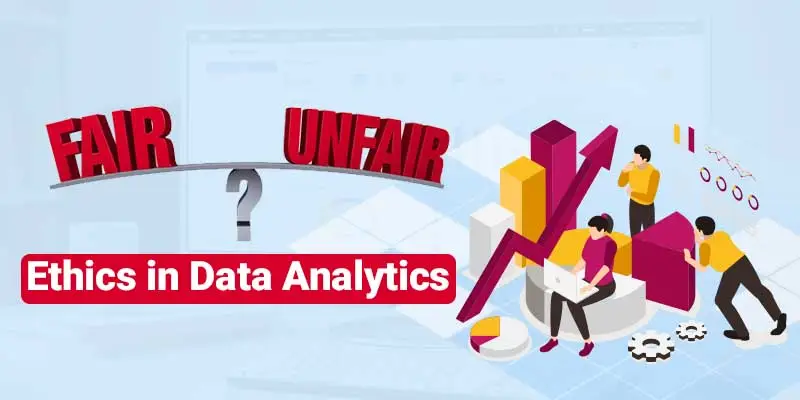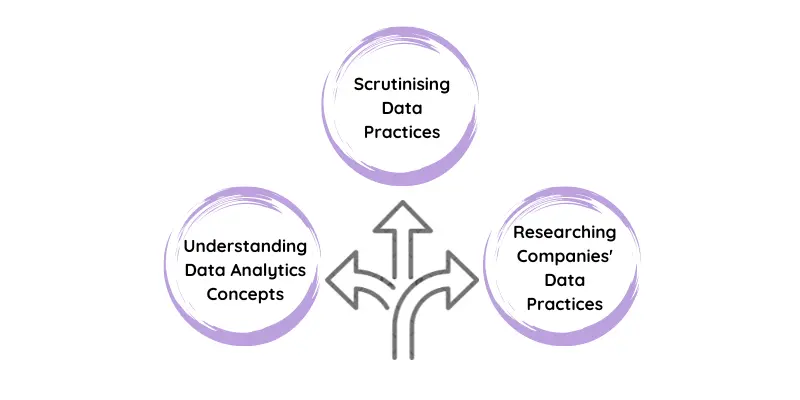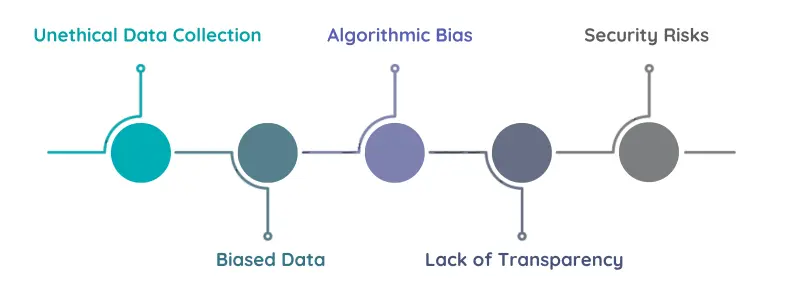
From targeted ads to personalised medicine, data analytics plays a key role in shaping our stories and experiences and influencing life decisions. But what about the ethics behind the ones and zeros?
With great power comes great responsibility. The moral implications of data collection, statistical analysis, and utilisation have become a pressing concern. This blog delves deep into ethics in data analytics, exploring its data’s ethical principles, potential pitfalls, fair and unfair practices in data analytics, and how could a data analyst correct the unfair practices.
What are Data Ethics?
Data ethics, in its essence, revolves around the responsible use of user information throughout its lifecycle. This consists of stages like data collection, storage, analysis, application and alertness. It encompasses a hard and fast of standards that ensure fairness, transparency, accountability, and respect for privacy throughout the data analytics process.
Techniques hired in data ethics mainly leverage machine learning algorithms to stumble on and mitigate biases, making sure of fair and unbiased outcomes. This concept falls underneath the broader umbrella of data ethics, which emphasises the data ethics principles specific to the data science field, where those machine learning models are built and deployed.
An MBA in Data Analytics in Chennai can provide students with a strong foundation in both data ethics and the technical skills necessary to implement these principles in real-world applications.
Why Data Ethics is Important?
B2B lead generation strategies often rely heavily on data collection techniques like website cookies, email marketing lists, and social media engagement. It is very important to build connection and trust for successful conversion. We discussed more about it in our blog on Advanced lead generation strategies.
Unethical data collection practices can erode trust which is important in commercial enterprise. When users sense their information is harvested with out transparency or consent, they grow to be hesitant to participate in data initiatives. This creates a vicious cycle, hindering innovation that relies on accountable data collection.
Data ethics is crucial to break this cycle and build a healthy data ecosystem where users feel secure knowing their information is handled responsibly. Here consent management platforms are a key tools, ensuring transparency in ethics while collecting user data. These platforms educate users with a clear understanding of how their data is being used and offer them the choice to control through opt-in and opt-out options.
Secondly, ethical practices ensure fairness. Biased data, often from historical prejudices reflected in datasets, can lead to discriminatory outcomes in areas like loan approvals or job applications. Data scientists can leverage techniques like fairness checks and bias detection algorithms to identify and mitigate these biases within unethically collected data before it is used for modelling.
Finally, ethical data practices enhance transparency. For instance, by understanding how their data is used through explainable AI techniques, individuals can make informed decisions about sharing information. This fosters accountability within organizations handling data.
Looking to pursue a career in data analytics? If you’re interested in learning more about data analytics programs, There are many Top MBA Colleges in Chennai thatcan provide you with the skills and knowledge you need to succeed in this in-demand field.
Data Ethics for All: A Shared Responsibility
The responsibility for data analytics ethics and their practices extends beyond data scientists and analysts. Businesses, policymakers, and even customers, all play a critical role in uplifting the ethical requirements. Businesses ought to enforce information governance frameworks, making sure facts is gathered with consent and used for its intended purpose. Policymakers can establish regulations that guard user privacy and responsible data practices.

Finally, users should be extra aware of the information they share and understand their rights regarding data collection. This involves using privacy settings on structures and understanding the data collection practices of apps and services they use.
Here are some ways to take charge of your data privacy:
Understanding Data Analytics Concepts
Familiarity with data ethics and privacy concepts empowers individuals to ask questions about how their data is used. This blog post is a great starting point!
Scrutinising Data Practices
Be mindful of the data you share online and with apps. Review privacy settings and opt out of unnecessary data collection.
Researching Companies’ Data Practices
Look for companies that prioritise data privacy and ethics. Some MBA programs even specialise in data science or business analytics, so this research could help you find the perfect program while you explore data ethics! Find Best MBA Colleges Near Me to explore and excel in data science.
Data Ethics vs Data Privacy
Data ethics and data privacy are two sides of the same coin. Data privacy makes a speciality on defending users’ control over their personal records. Ethical data practices makes certain that data collected adheres to privacy regulations (like GDPR or CCPA) and is utilised in a way that respects users’ rights. Together, data ethics and data privacy shape the for a responsible data-driven world.
Data Ethics Case Study
Imagine an enterprise developing a credit scoring algorithm. The rules are predicated on historic loan information, which may include biases that unfairly disadvantage particular demographic groups. This state of affairs highlights the importance of data ethicsin data science.
What Data Ethics Concept does this Describe? Fairness.
By employing techniques like fairness checks and bias detection algorithms, the company can identify and mitigate these biases. For instance, they could remove sensitive attributes like race or zip code from the data used to train the model or employ fairness-aware model training techniques. This case study exemplifies how data ethics translates into practical action within the field of data science.
Ethical Issues in Data Analytics

Despite its importance, data ethics is not without its challenges. Here are some common ethical issues encountered in data analytics:
Unethical Data Collection
Unethical data collection takes place when information is gathered without the right consent or through deceptive practices violates data ethics principles. Techniques like honeypotting, wherein fake records are planted to entrap malicious actors, can be ethical whilst used for safety purposes, however data collection for different purposes need to be obvious and with informed consent.
Biased Data
Data that reflects historical biases can have outright discriminatory effects. Techniques to that cope with biased data records consists information augmentation, wherein synthetic data is created to stable out a dataset, or hostile debiasing, where a second model is trained to remove bias from the main one.
Algorithmic Bias
Alneedsthms trained on biased data can perpetuate those biases in their outputs. As cited before, fairness tests and bias detection algorithms can help detect algorithmic bias, and becoming aware of algorithmic bias and model training strategies can assist in mitigating it.
Lack of Transparency
When individuals don’t understand how their data is used, it undermines trust and accountability. Explainable AI (XAI) strategies can be hired to shed light on the algorithms’ decision making process, allowing users to apprehend how their data contributes to the final outcome.
Security Risks
There is a high chance of data breaches and unauthorised access, which can lead to the disclosure of sensitive information. Robust data security practices, including encryption and access controls, are crucial for mitigating these risks.
If you want to gain the necessary skills and knowledge to thrive in this exciting domain, consider exploring MBA Courses in Chennai, specialising in data analytics. These programs can provide a well-rounded education that equips you with the technical expertise in data analysis and instils a strong foundation in data ethics.
How Could a Data Analyst Correct the Unfair Practices?
Data analysts are at the forefront of data collection, analysis and storage. Here’s how they can achieve that with ethical practices:
Question the Origin
Understand how data is collected and ensure it adheres to ethical guidelines. Data analysts must be aware of the source of the data they are working with and inquire about data collection practices.
Identify and Mitigate Biases
Be aware of potential biases in data and employ strategies to deal with them. Data analysts can make use of tools for bias detection and fairness checks to identify problematic biases in datasets. They can then implement strategies like data cleaning or fairness-aware modelling to mitigate these biases.
Promote Transparency
Clearly communicate how data is being used and ensure individuals understand their rights. Data analysts can play a role in crafting clear communication explaining how data is collected and used. They can also advocate for the development of user-friendly interfaces that permit individuals to access and control their data.
Advocate for Responsible AI
Master the development and deployment of ethical AI algorithms. Data analysts can influence the development process by voicing concerns about potential ethical issues with AI algorithms and advocating for the use of fair strategies.
Uphold Data Security
Implement robust security measures to protect sensitive information. Data analysts can take part in security training programs and implement best practices for data handling and storage to minimise security risks.
Data ethics is not always a one-time fix; it’s an ongoing process that calls for continuous vigilance and adaptation. By embracing data ethics principles, agencies, policymakers, and users can work together to make sure a more responsible and equitable data-driven future. Remember, data is a powerful tool, and with exquisite power comes high-quality duty.
Let’s use data for good, fostering a world where data analytics empowers all while upholding ethical principles. As data continues to grow in volume and complexity, the need for ethical practices in data analytics will only become more critical. By working together, we can ensure that the data revolution benefits everyone.
This blog aims to provide a comprehensive yet engaging overview of ethics in data analytics. It is just the beginning of the conversation. As data continues to evolve, so too must our approach to its ethical use.
If you’re interested in pursuing a career in this rapidly growing field, consider researching MBA Data Analytics Colleges. These colleges provide programs that equip you with the skills and knowledge necessary to succeed in data analytics while also emphasizing the ethical considerations that are paramount in this domain.

